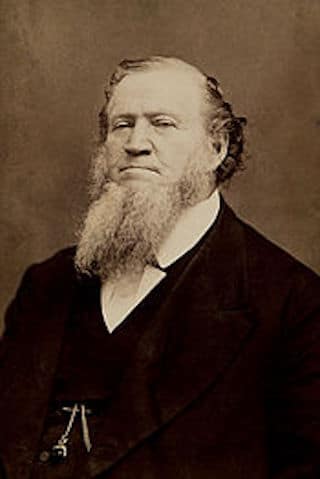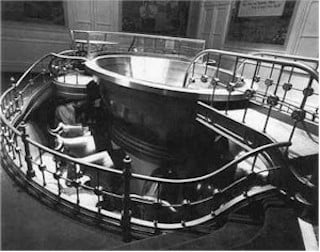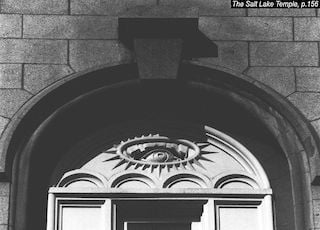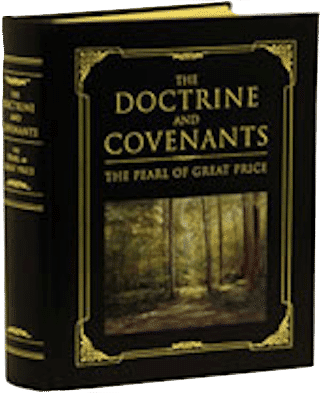
 I had talked about the Muslims a couple days ago when we read 2 Peter 2 (The Muslims Are Coming, the Muslims Are Coming) and when we read 2 Peter 3 I had talked about Muhammad and The Koran.
I had talked about the Muslims a couple days ago when we read 2 Peter 2 (The Muslims Are Coming, the Muslims Are Coming) and when we read 2 Peter 3 I had talked about Muhammad and The Koran.
Did you know that the Russians aren’t that fond to the Muslims either? Tomorrow we’ll look at…
1 John 3
Obedience and Love
1 Behold, what manner of love the Father hath bestowed upon us, that we should be called the sons of God: therefore the world knoweth us not, because it knew him not.

He was the President of The Church of Jesus Christ of Latter-day Saints (LDS Church) from 1847 until his death in 1877.
He founded Salt Lake City and he served as the first governor of the Utah Territory, United States.
Young was dubbed by his followers the “Lion of the Lord” for his bold personality, and was also commonly called “Brother Brigham” by Latter-day Saints.
Young was a polygamist and was involved in controversies regarding black people and the Priesthood, the Utah War, and the Mountain Meadows massacre.
Beloved, now are we the sons of God and it doth not yet appear what we shall be: but we know that, when he shall appear, we shall be like him; for we shall see him as he is.
We will continue to be the “sons” of God, not gods. If the Mormons want they can be gods in hell, or they can wake up and smell the coffee.
3 And every man that hath this hope in him purifieth himself, even as he is pure.
“Hope” – not a mere wish, but unshakable confidence concerting the future.
4 Whosoever committeth sin transgresseth also the law: for sin is the transgression of the law.
5 And ye know that he was manifested to take away our sins; and in him is no sin.
6 Whosoever abideth in him sinneth not: whosoever sinneth hath not seen him, neither known him.
“Sinneth not” – John is not asserting sinless perfection, but explaining that the believer’s life is characterized not by sin but by doing what is right – not sinning willfully.
7 Little children, let no man deceive you: he that doeth righteousness is righteous, even as he is righteous.
8 He that committeth sin is of the devil; for the devil sinneth from the beginning. For this purpose the Son of God was manifested, that he might destroy the works of the devil.
See Jn 8:44.
9 Whosoever is born of God doth not commit sin; for his seed remaineth in him: and he cannot sin, because he is born of God.
“His seed” – the picture is of human reproduction, in which the sperm (the Greek for “seed” is sperma) bears the life principle and transfers the paternal characteristics.
“Cannot sin” – not a complete cessation of sin, but a life that is not characterized by sin.
10 In this the children of God are manifest, and the children of the devil: whosoever doeth not righteousness is not of God, neither he that loveth not his brother.
11 For this is the message that ye heard from the beginning, that we should love one another.
“From the beginning” – see 2:7.

In the ancient Temple of Solomon, a deep brass basin similarly “stood upon twelve oxen…and the sea was set above them, and all their hinder parts were inward” (1 Kgs 7:25).
12 Not as Cain, who was of that wicked one, and slew his brother. And wherefore slew he him? Because his own works were evil, and his brother’s righteous.
“Cain” – see Heb 11:4.
13 Marvel not, my brethren, if the world hate you.
14 We know that we have passed from death unto life, because we love the brethren. He that loveth not his brother abideth in death.
15 Whosoever hateth his brother is a murderer: and ye know that no murderer hath eternal life abiding in him.
“Hateth” – see 2:9-10.
16 Hereby perceive we the love of God, because he laid down his life for us: and we ought to lay down our lives for the brethren.
17 But whoso hath this world’s good, and seeth his brother have need, and shutteth up his bowels of compassion from him, how dwelleth the love of God in him?
3:17-18 – see Jas 2:14-17.
“Love of God” – God’s kind of love, which He pours out in the believer’s heart (Rom 5:5) and which in turn enables the Christian to love fellow believers. Or it may speak of the believer’s love for God.

In the ancient Temple of Solomon, a deep brass basin similarly “stood upon twelve oxen…and the sea was set above them, and all their hinder parts were inward” (1 Kgs 7:25).
18 My little children let us not love in word, neither in tongue; but in deed and in truth.
19 And hereby we know that we are of the truth, and shall assure our hearts before him.
20 For if our heart condemn us, God is greater than our heart, and knoweth all things.
21 Beloved, if our heart condemn us not, then have we confidence toward God.
22 And whatsoever we ask, we receive of him, because we keep his commandments, and do those things that are pleasing in his sight.
23 And this is his commandment, That we should believe on the name of his Son Jesus Christ, and love one another, as he gave us commandment.
This command has two parts: (1) Believe in Christian (see Jn 6:29), and (2) love each other (see Jn 13:24-35). The first part is developed in 4:1-6 and the second part in 4:7-12.
24 And he that keepeth his commandments dwelleth in him, and he in him. And hereby we know that he abideth in us, by the Spirit which he hath given us.
Mormonism
Mormonism is the predominant religious tradition of the Latter Day Saint movement of Restorationist Christianity. This movement was founded by Joseph Smith, Jr., in the 1820s.

The relationship between Mormonism and Freemasonry began early in the life of Mormon founder Joseph Smith, Jr., as his older brother and possibly his father were Freemasons while the family lived near Palmyra, New York.
Nevertheless, in the late 1820s, the western New York region was swept with anti-Masonic fervor, and the Book of Mormon, a foundational religious book published by Smith in 1830, is generally considered to reflect that anti-Masonic sentiment by condemning what it portrays as oath-bound conspiratorial organizations.
During the 1830s and 1840s, Mormonism gradually distinguished itself from traditional Protestantism. Mormonism today represents the new, non-Protestant faith taught by Smith in the 1840s.
After Smith’s death, most Mormons followed Brigham Young west, calling themselves The Church of Jesus Christ of Latter-day Saints (LDS Church).
Other variations of Mormonism include Mormon fundamentalism, which seeks to maintain practices and doctrines such as polygamy that were abandoned by the LDS Church, and various other small independent denominations.
The word Mormon is derived from the Book of Mormon, one of the faith’s religious texts. Based on the name of that book, early followers of founder Joseph Smith, Jr. were called Mormons, and their faith was called Mormonism.
The term was initially considered pejorative, but is no longer considered so by Mormons (although other terms such as Latter Day Saint, or LDS, are generally preferred).
Mormonism shares a common set of beliefs with the rest of the Latter Day Saint movement, including use of, and belief in, the Bible, as well as other religious texts including the Book of Mormon and Doctrine and Covenants.
It also accepts the Pearl of Great Price as part of its scriptural canon, and has a history of teaching eternal marriage, eternal progression, and plural marriage, although the LDS Church formally abandoned the practice in 1891.
Cultural Mormonism includes a lifestyle promoted by the Mormon institutions, and includes cultural Mormons who identify with the culture, but not necessarily the theology.
Relation to Judaism
Although Mormons do not claim to be part of Judaism, Mormon theology claims to situate Mormonism within the context of Judaism to an extent that goes beyond what most other Christian denominations claim.
The faith incorporates many Old Testament ideas into its theology, and the beliefs of Mormons sometimes parallel those of Judaism and certain elements of Jewish culture.

At age twenty-four, Smith published the Book of Mormon, and by the time of his death fourteen years later, he had attracted tens of thousands of followers, established cities and temples, and founded a religion and a religious culture that continues to the present day.
By the 1840s, Smith and several prominent Mormons had become Freemasons and founded a lodge in Nauvoo, Illinois, in March 1842.
Soon after joining Freemasonry, Smith introduced a temple endowment ceremony including a number of symbolic elements that were essentially identical with their analogues within Freemasonry.
Smith remained a Freemason until his death; however, later Mormon leaders distanced themselves from Freemasonry.
In modern times, The Church of Jesus Christ of Latter-day Saints (LDS Church), the predominant Mormon organization, holds no position for or against the compatibility of Masonry with LDS Church doctrine.
In the earliest days of Mormonism, Joseph Smith taught that the indigenous peoples of the Americas were members of some of the Lost Tribes of Israel.
Later, he taught that Mormons were Israelites, and that they may learn of their tribal affiliation within the twelve Israelite tribes. Members of the LDS Church receive Patriarchal blessings which declare the recipient’s lineage within one of the tribes of Israel.
The lineage is either through true blood-line or adoption. The LDS Church teaches that if one is not a direct descendant of one of the twelve tribes, upon baptism he or she is adopted into one of the tribes.
Patriarchal blessings also include personal information which is revealed through a patriarch by the power of the priesthood.
The Mormon affinity for Judaism is expressed by the many references to Judaism in the Mormon liturgy. For example, Smith named the largest Mormon settlement he founded Nauvoo, which means “to be beautiful” in Hebrew.
Brigham Young named a tributary of the Great Salt Lake the “Jordan River“. The LDS Church created a writing scheme called the Deseret Alphabet, which was based, in part, on Hebrew.
The LDS Church has a Jerusalem Center in Israel, where students focus their study on Near Eastern history, culture, language, and the Bible.
There has been some controversy involving Jewish groups who see the actions of some elements of Mormonism as offensive.
In the 1990s, Jewish groups vocally opposed the LDS practice of baptism for the dead on behalf of Jewish victims of the Holocaust and Jews in general.
According to LDS Church general authority Monte J. Brough, “Mormons who baptized 380,000 Holocaust victims posthumously were motivated by love and compassion and did not understand their gesture might offend Jews… they did not realize that what they intended as a ‘Christian act of service’ was ‘misguided and insensitive'”.
Mormons believe that when the dead are baptized through proxy, they have the option of accepting or rejecting the ordinance.
Relation to Islam
Since its origins in the 19th century, Mormonism has been compared to Islam, often by detractors of one religion or the other.
For instance, Joseph Smith was referred to as “the m0dern mahomet” [sic] by the New York Herald, shortly after his murder in June 1844.

Mitt Romney is evil not only because he’s a Mormon.
By Pete Kotz – Nov 22nd, 2011 – News
Last month evangelical leaders gathered in Washington, D.C., for the Values Voter Summit, where disciples of the Pissed-Off Jesus harrumphed about how much America sucked.
That’s when the bomb ignited. As you may recall, preacher Robert Jeffress was on hand to introduce Rick Perry.
He warned that Mormon “cult” members were not only despoiling Broadway but were actually running for president.
“Non-Christians” like Mitt Romney and Jon Huntsman had invaded the Republican primary like a bunch of damn Mexicans — and they didn’t even have comparable skill at operating a riding lawn mower.
If patriots didn’t take heed, Jeffress cautioned, America would soon be possessed by heretics.
We decided to get to the bottom of this menace, providing answers to your most alarmed and misguided questions:
Why do Mormons worship Satan?
They don’t, actually. They believe in God and Jesus.
It’s just that those guys get busy, so they named Joseph Smith their VP of Operations here on Earth.
Smith was a magician from Palmyra, N.Y., in the 1820s. He was also the first American to possess superpowers, claiming he could find precious minerals and buried treasure by staring at rocks. Farmers paid him $3 a day to locate riches beneath their fields.
This epithet repeated a comparison that had been made from Smith’s earliest career, one that was not intended at the time to be complimentary.
Comparison of the Mormon and Muslim prophets still occurs today, sometimes for derogatory or polemical reasons but also for more scholarly (and neutral) purposes.
While Mormonism and Islam certainly have many similarities, there are also significant, fundamental differences between the two religions.
Mormon–Muslim relations have been historically cordial; recent years have seen increasing dialogue between adherents of the two faiths, and cooperation in charitable endeavors, especially in the Middle and Far East.
Islam and Mormonism both originate in the Abrahamic traditions. Each religion sees its founder (Muhammad for Islam, and Joseph Smith for Mormonism) as being a true prophet of God, called to re-establish the truths of these ancient theological belief systems that have been altered, corrupted, or lost.
In addition, both prophets received visits from an angel, leading to additional books of scripture. Both religions share a high emphasis on family life, charitable giving, chastity, abstention from alcohol, and a special reverence for, though not worship of, their founding prophet.
Before the 1890 Manifesto against plural marriage, Mormonism and Islam also shared in the belief in and practice of plural marriage, a practice now held in common by Islam and various branches of Mormon fundamentalism.
The religions differ significantly in their views on God. Islam insists upon the complete oneness and uniqueness of God (Allah), while Mormonism asserts that the Godhead is made up of three distinct “personages.”
Mormonism sees Jesus Christ as the promised Messiah and the literal Son of God, while Islam insists that the title “Messiah” means that Jesus (or “Isa“) was a prophet sent to establish the true faith, not that he was the Son of God or a divine being.
Despite opposition from other Christian denominations, Mormonism identifies itself as a Christian religion, the “restoration” of primitive Christianity.
Islam does not refer to itself as “Christian”, asserting that Jesus and all true followers of Christ’s teachings were (and are) Muslims–a term that means submitters to God–not Christians as the term is used today.
Islam proclaims that its prophet Muhammad was the “seal of the prophets”, and that no further prophets would come after him.
Mormons, though honoring Joseph Smith as the first prophet in modern times, see him as just one in a long line of prophets, with Jesus Christ being the premier figure of the religion
Mormons have a scriptural canon consisting of the Bible, the Book of Mormon, and a collection of revelations and writings by Joseph Smith known as the Doctrine and Covenants and Pearl of Great Price.

The other three books are the Bible, the Book of Mormon, and the Pearl of Great Price.
These four books combine together into what is known as “The Standard Works” of the church.
The LDS Standard Works are extensively cross referenced, and are studied in harmony together.
Each book of scripture is revered individually, but we believe it is the combination which offers powerful clarity and validity to all.
Mormons however have a fairly open definition of scripture. As a general rule, anything spoken or written by a prophet, while under inspiration, is considered to be the word of God.
Thus, the Bible, written by prophets, is the word of God, so far as it is translated correctly. The Book of Mormon is also believed to have been written by ancient prophets, and is viewed as a companion to the Bible.
The Mormons also believe that:
* faithful Mormon males and females can become Gods and Goddesses, eventually, after a long (almost evolutional) learning curve.
* God, Our Father and His Son, Jesus Christ have resurrected bodies of flesh and bones, not spirits.
* we are literal Sons and Daughters of God, not created beings.
* God operates from the basis that “Knowledge is Power,” rather than love.
Wow, after reading that it really makes you wish you were a Mormon, doesn’t it? I was being sarcastic and I forgot who I was talking to.
Since Romney was unable to defeat Obama in the presidential campaign in 2012 I doubt he will ever be able to become a god.
Yet, maybe Obama will want to change from being a Muslim to a Mormon and they’d let him become a god or maybe, because the way he is, a goddess.
Wouldn’t matter, all Mormons and Muslims are going to hell anyway.
…Vladimir Putin on Muslims.
Visits: 0
